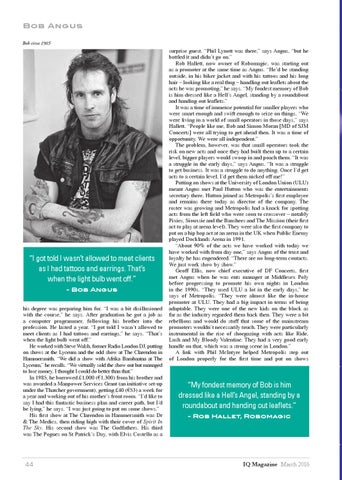Bob Angus Bob circa 1985
“I got told I wasn’t allowed to meet clients as I had tattoos and earrings. That’s when the light bulb went off.” - Bob Angus his degree was preparing him for. “I was a bit disillusioned with the course,” he says. After graduation he got a job as a computer programmer, following his brother into the profession. He lasted a year. “I got told I wasn’t allowed to meet clients as I had tattoos and earrings,” he says. “That’s when the light bulb went off.” He worked with Steve Walsh, former Radio London DJ, putting on shows at the Lyceum and the odd show at The Clarendon in Hammersmith. “We did a show with Afrika Bambaataa at The Lyceum,” he recalls. “We virtually sold the show out but managed to lose money. I thought I could do better than that.” In 1985, he borrowed £1,000 (€1,300) from his brother and was awarded a Manpower Services Grant (an initiative set-up under the Thatcher government), getting £40 (€53) a week for a year and working out of his mother’s front room. “I’d like to say I had this fantastic business plan and career path, but I’d be lying,” he says. “I was just going to put on some shows.” His first show at The Clarendon in Hammersmith was Dr & The Medics, then riding high with their cover of Spirit In The Sky. His second show was The Godfathers. His third was The Pogues on St Patrick’s Day, with Elvis Costello as a
44
surprise guest. “Phil Lynott was there,” says Angus, “but he bottled it and didn’t go on.” Rob Hallett, now owner of Robomagic, was starting out as a promoter at the same time as Angus. “He’d be standing outside, in his biker jacket and with his tattoos and his long hair – looking like a real thug – handling out leaflets about the acts he was promoting,” he says. “My fondest memory of Bob is him dressed like a Hell’s Angel, standing by a roundabout and handing out leaflets.” It was a time of immense potential for smaller players who were smart enough and swift enough to seize on things. “We were living in a world of small operators in those days,” says Hallett. “People like me, Bob and Simon Moran [MD of SJM Concerts] were all trying to get ahead then. It was a time of opportunity. We were all independent.” The problem, however, was that small operators took the risk on new acts and once they had built them up to a certain level, bigger players would swoop in and poach them. “It was a struggle in the early days,” says Angus. “It was a struggle to get business. It was a struggle to do anything. Once I’d get acts to a certain level, I’d get them nicked off me!” Putting on shows at the University of London Union (ULU) meant Angus met Paul Hutton who was the entertainments secretary there. Hutton joined as Metropolis’s first employee and remains there today as director of the company. The roster was growing and Metropolis had a knack for spotting acts from the left field who were soon to crossover – notably Pixies, Siouxsie and the Banshees and The Mission (their first act to play at arena level). They were also the first company to put on a hip hop act at an arena in the UK when Public Enemy played Docklands Arena in 1991. “About 90% of the acts we have worked with today we have worked with from day one,” says Angus of the trust and loyalty he has engendered. “There are no long-term contacts. We just work show by show.” Geoff Ellis, now chief executive of DF Concerts, first met Angus when he was ents manager at Middlesex Poly before progressing to promote his own nights in London in the 1990s. “They used ULU a lot in the early days,” he says of Metropolis. “They were almost like the in-house promoter at ULU. They had a big impact in terms of being adaptable. They were one of the new kids on the block as far as the industry regarded them back then. They were a bit rebellious and would do stuff that some of the mainstream promoters wouldn’t necessarily touch. They were particularly instrumental in the rise of shoegazing with acts like Ride, Lush and My Bloody Valentine. They had a very good early handle on that, which was a strong scene in London.” A link with Phil McIntyre helped Metropolis step out of London properly for the first time and put on shows
“My fondest memory of Bob is him dressed like a Hell’s Angel, standing by a roundabout and handing out leaflets.” - Rob Hallet, Robomagic
IQ Magazine March 2016
